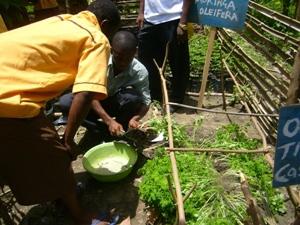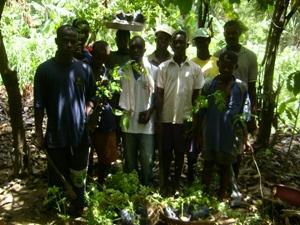Yaw Kwateng
The project aims are to create awareness on medicinal plant conservation and their sustainable use and also promote its cultivation through the establishment of herb garden.

Illustration to a student on how seedlings are uprooted and transplanted.
The project is to be carried out at Lake Bosomtwe, one of the world's six major crater lakes, found in the Ashanti region, about 35km South East of the regional city, Kumasi. It falls within the peripheral semi- evergreen forest and the Guineo-Congolian regional centre of endemism. The lake basin is endowed with rich flora of global and national conservation significance that are important biodiversity for traditional medicine. However, this biodiversity is under serious threat from a variety of human induced pressures.

Some local people involved in project activities.
The project seeks to conserve and promote sustainable use of medicinal plants of Lake Bosomtwe and its environs. This is a build up of a survey conducted at Lake Bosumtwe which sought to gather information and develop data base of plant species of conservation importance. It however reveals the extent to which plant species of conservation importance have been over exploited leading to dwindling levels of plant resources as a result of bush fires, excessive collection of medicinal plants from the wild, unsustainable agricultural practices, settlement expansion and indiscriminate felling of trees for firewood and logs. Therefore, the need to develop measures to reverse the situation through good conservation practices and awareness raising campaigns on over exploitation and sustainable use is very critical due to the role medicinal plant and for that matter traditional medicine play in the health needs of local
inhabitants.
Baseline activities are grouped into two components including; awareness raising campaigns:
It aims at sensitizing local users through community forums and workshop on best environmentally friendly practices for harvesting medicinal plants from the wild and the diffusion of the perception that only wild species types other than cultivated types have high therapeutic properties or efficacy.
Documentaries on best practices as well as public education on community radio on medicinal biodiversity conservation would be incorporated in the programme.
Local schools will play an important role in the implementation. Debates and quiz competitions will be organized for them.
Establishment of pilot herb garden:It aims at establishing seed nursery to enhance the preservation of medicinal plant genetic resources and also increase domestic use.
The target group will include local users, school children and the district assembly.
It is anticipated that the local community would have been sensitized on medicinal plant conservation and pilot herb garden and nursery established.